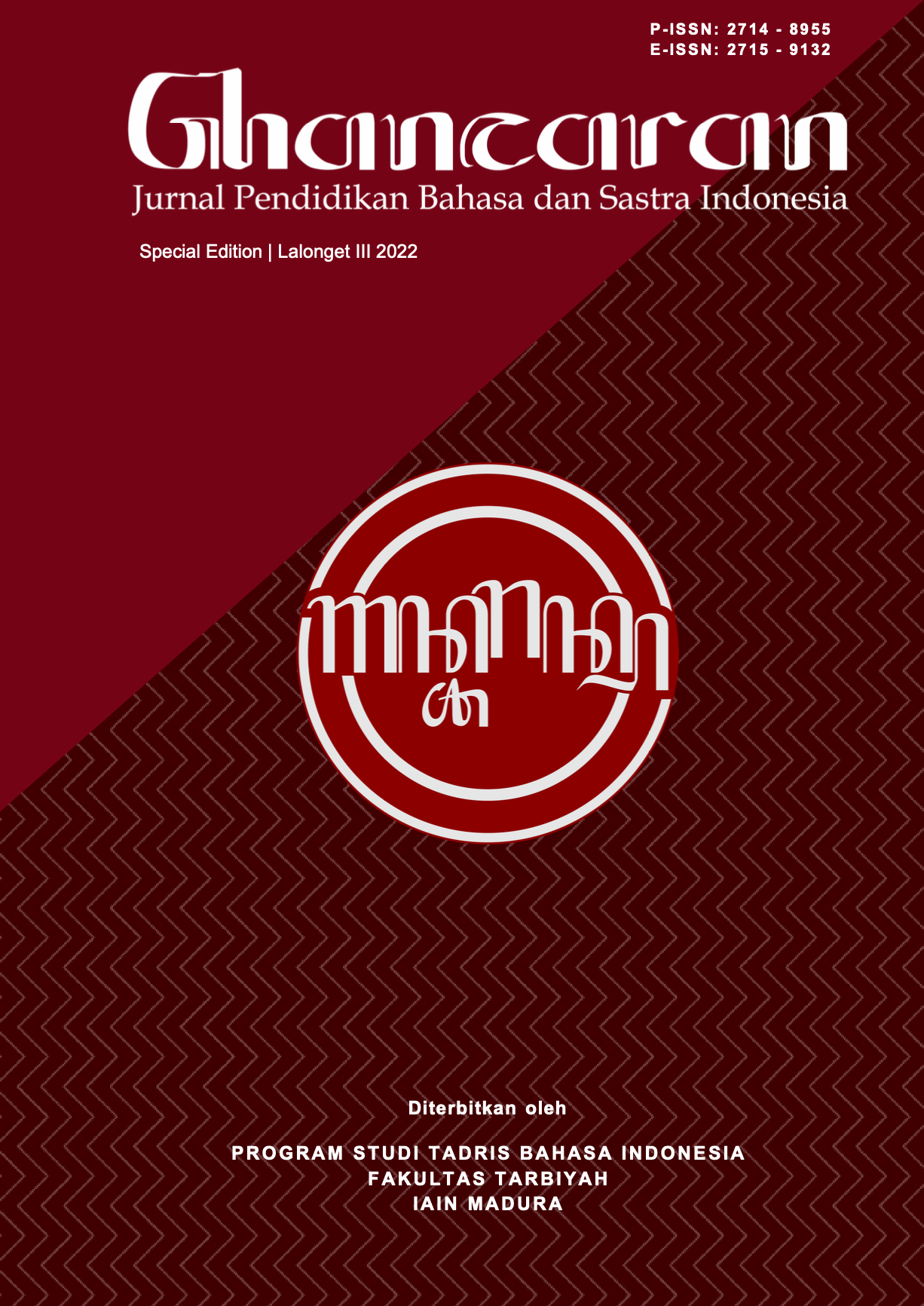Pengaruh Permainan Kosakata Bahasa Inggris Melalui Digital Smart Board For Kids Terhadap Perkembangan Bahasa Anak Usia 5-6 Tahun di Era Merdeka Belajar
 Abstract views: 360
,
Abstract views: 360
,
 PDF downloads: 318
PDF downloads: 318
Abstract
This research will use the Digital Smart Board for Kids game as a means of learning English vocabulary for young children. This study uses a type of quantitative research using a pre-experimental design with one group pretest-posttest. The research subjects in this study were 15 children aged 5-6 years. The selection of subjects takes into account the application of foreign languages, especially English in teaching and learning activities in kindergarten. Data collection techniques using observation and documentation. To draw conclusions from the research results, a hypothesis test was carried out using the t-test. Before conducting the t-test, the normality test and homogeneity test were first carried out on the research results. Where the alpha value is more than 0.05, the data is considered good and reliable. Hypothesis testing was carried out to determine the effect of English vocabulary games through the Digital Smart Board for Kids on the language development of children aged 5-6 years in the independent learning era. This Digital Smart Board game for kids can be played by all children, so that development in the classroom becomes more applicable, contextual and interesting. In conclusion, the Digital Smart Board game for kids can be used to develop children's language development properly, especially in terms of understanding, remembering and pronouncing/imitating English vocabulary in children aged 5-6 years in the era of independent learning.
Downloads
References
Anggraini, K., Masitoh, S., & Izzati, U. A. (2018). The Influence of Smart Board Game Toward 4-5 years old Children’s Cognitive Development.
Ardhayantama, V. (2020). Perkembangan Bahasa Anak. Jakarta: Stiletto Indie Book.
Asmawati, L., & dkk. (2010). Pengelolaan Kegiatan Pengembangan Anak Usia Dini. Jakarta: Universitas Terbuka.
Asyhar, R. (2012). Kreatif Mengembangkan Media Pembelajaran. Jakarta: Referensi Jakarta.
Bialystok, E., B. R., B. A., & P.-D. D. (2010). Word Mapping and Executive Functioning in Young Monolingual and Bilingual Children. Journal of Cognition and Development: Official Journal of the Cognitive Development Society, 11(4), 485–508.
Dhieni, N., & al, e. (2014). Metode Pengembangan Bahasa. Jakarta: Universitas Terbuka.
Hermawan, A. (2015). Peningkatan Kemampuan Bahasa Reseptif dan Bahasa Ekspresif Pada Anak Tunarungu Melalui Lirik Lagu Halo-Halo Bandung di SL-B Prima Bhakti Mulia Kota Cimahi. Jurnal: Universitas Pendidikan Indonesia, 1–8.
Indrijati, H. (2016). Psikologi Perkembangan dan Pendidikan Anak Usia Dini. Jakarta: Kencana.
Khadijah. (2016). Pendidikan Prasekolah. Medan: Perdana Publishing.
Khaironi, M. (2018). Perkembangan Anak Usia Dini. Jurnal Golden Age Hanzanwadi University, 3(1), 1–12.
Madyawati, L. (2016). Strategi Perkembangan Bahasa Pada Anak. Jakarta: Prenadamedia Group.
Mahmud, S. (2019). Teori Belajar Bahasa. Syiah Kuala University Press Darussalam.
Markus, N. e. (2017). Penguasaan Kosakata Bahasa Indonesia Anak Usia 4-5 Tahun. Jurnal Ilmiah: Fenomena, Vol 4(No. 2), Pg. 102-115. Jurnal Ilmiah: Fenomena, 4(2), 102-115.
Mitchell, R. M. F. & M. E. (2019). Second Language Learning Theories. Routledge.
Morrison, G. S. (2012). Dasar-Dasar Pendidikan Anak Usia Dini (PAUD). Indeks.
Pransiska Rismaren. (2018). Kajian Program Bilingual terhadap Perkembangan Kognitif Anak Usia Dini. Jurnal Pendidikan, Universitas Negeri Padang, Indonesia, 10(2).
Putikadyanto, A. P. A., Efendi, A. N., Romadhon, S., Amin, M. B., & Sefrianah, N. A. (2021). Persepsi Siswa terhadap Pembelajaran Bahasa Indonesia Berbasis Daring di SMAN 1 Pasuruan. GHANCARAN: Jurnal Pendidikan Bahasa dan Sastra Indonesia, 104-116.
Sujiono, Y. N. (2009). Konsep Dasar Pendidikan Anak Usia Dini. Jakarta: PT Indeks.
Susanto, A. (2012). Perkembangan Anak Usia Dini. Jakarta: Kencana.
Copyright (c) 2022 GHANCARAN: Jurnal Pendidikan Bahasa dan Sastra Indonesia

This work is licensed under a Creative Commons Attribution-ShareAlike 4.0 International License.
Ghancaran: Jurnal Pendidikan Bahasa dan Sastra Indonesia uses an Open Access Policy under the Creative Commons Attribution-ShareAlike 4.0 International License. Authors publishing in this journal agree to the following terms:
- Ghancaran Journal holds the copyright and grants the journal rights for first publication with the work simultaneously licensed under a

The work is distributed under Creative Commons Attribution-ShareAlike 4.0 International License which allows others to share, copy, and redistribute the material in any media or format and adapt, remix, change, and develop the material even for commercial purposes, as long as it is stated credit and license derivative works under similar terms. - Authors may make additional contractual arrangements for non-exclusive distribution of the journal's published work version.
- Authors are permitted to post their work online (e.g., in institutional repositories or on their websites) before and during submission, as doing so may lead to productive exchange.



















